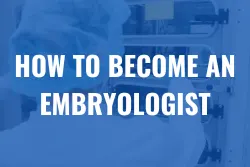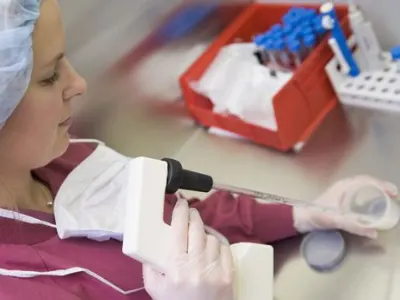Last Updated: July 2nd, 2022 by

Career Shortcuts
Do you want to help couples achieve their dreams of becoming parents? Are you interested in the science of life and how it begins?
If so, then a career as an embryologist may be perfect for you! It takes years of training and experience to become an embryologist, but it’s a gratifying career.
This blog post will discuss how to become an embryologist, including the educational requirements and the different types of jobs available in this field.
So, if you’re ready to start your journey toward becoming an embryologist, keep reading!
Visit our Career Guide for a list of all our job insights for an in depth look at the new career path you are considering.
What is an Embryologist?

An embryologist is a scientist who studies embryos and their development. Embryologists may work with human embryos, animal embryos, or plant embryos.
They use various techniques to examine these embryos, including microscopy, genetic testing, and tissue culture.
Embryologists often work in fertility clinics to help couples conceive children through in-vitro fertilization (IVF).
An embryo is created outside the womb in IVF and then implanted into the mother’s uterus.
Embryologists also play an essential role in stem cell research. By studying early-stage embryos, they hope to learn how to manipulate cells to create new tissue or organs.
Ultimately, the goal of embryology is to improve the understanding of human development and find ways to prevent and treat congenital disabilities.

Career Guide
Steps Necessary to Become an Embryologist
There are steps one must follow to become an embryologist.
Complete a Bachelor’s Degree in Biology or a Related Scientific Discipline

The first step to becoming an embryologist is to complete a bachelor’s degree in biology or biological science.
During your undergraduate studies, you’ll likely take classes in anatomy, physiology, cell biology, and other related disciplines.
It would help if you also considered participating in a research project or externship to gain experience.
Once you’ve earned your degree, you’ll need to complete a professional master’s program in embryology.
These programs typically last 4 years and include courses in reproductive endocrinology, infertility, and assisted reproductive technologies.
After completing your education and passing any required exams, you’ll be eligible to earn a license to practice embryology in your state.
Obtain a Master of Clinical Embryology Degree
After completing a bachelor’s degree in biology or a related field, the next step for those interested in becoming an embryologist is to earn a Master of Clinical Embryology.
This advanced degree program typically takes 2 to 3 years to complete and provides the knowledge and skills necessary to work in IVF or other fertility clinic.
Students take reproductive anatomy and physiology courses, endocrinology, and embryology during the program.
They also complete clinical rotations, during which they gain hands-on experience working with patients and IVF laboratory equipment.
After completing a Master of Clinical Embryology, graduates are prepared to sit for the American Board of Bioanalysis certification exam.
With this credential, they can begin their career as a certified clinical embryologist.
Gain On-the-Job Training
Completing an accredited degree program is the first step toward becoming an embryologist, but it is not the final step.
After graduation, embryologists must complete a rigorous on-the-job training program to become certified.
The length of the training program varies depending on the state in which you are employed, but typically lasts two to three years.
Embryologists will learn how to perform all of their job duties, from assisting with infertility treatments to harvesting eggs and sperm.
They also gain experience in managing a lab and working with patients.
Upon completing the training program, embryologists must pass a series of exams to be certified by the American Board of Embryology.
With this certification in hand, embryologists can finally begin their careers and start making a difference in the lives of couples struggling with infertility.
Types of Jobs Available in this Field

Becoming an embryologist is a great way to help people have children. This job helps with in-vitro fertilization and other procedures that allow couples to conceive.
It is an essential and demanding job, but it is also gratifying.
FAQs
How Long Does it Take to Become an Embryologist?
It typically takes 4 years to become an embryologist, from completing a bachelor’s degree to finishing a professional master’s program.
However, the length of time may vary depending on the state of employment and the type of training you receive.
What Type of Job Can I Get as an Embryologist?
There are many different types of jobs available for embryologists. You could work in a hospital, a fertility clinic, or even in private practice.
No matter where you work, you will be helping couples to have the families they have always wanted.
What’s the Average Salary of an Embryologist?
The average salary for an embryologist is $80,000 per year. However, salaries can vary depending on experience and location.
For a closer look into the life of an Embryologist, check out this video:
Conclusion
If you want to help people have children and make a difference in their lives, becoming an embryologist may be the perfect career for you.
There are many different ways to get started, from taking classes online or at a local community college to completing an accredited professional master’s program.
No matter what route you choose, you will need to complete on-the-job training and pass a series of exams to become certified.
With certification, you can finally begin your career as an embryologist and start making a difference in the lives of couples struggling with infertility.
Other Interesting Articles
